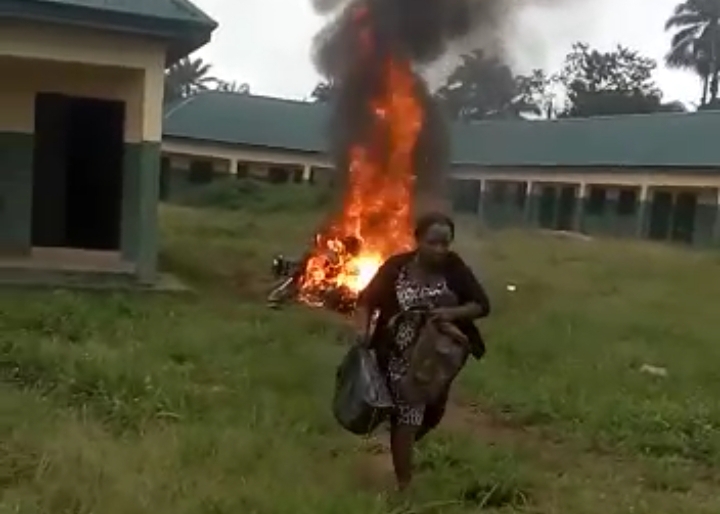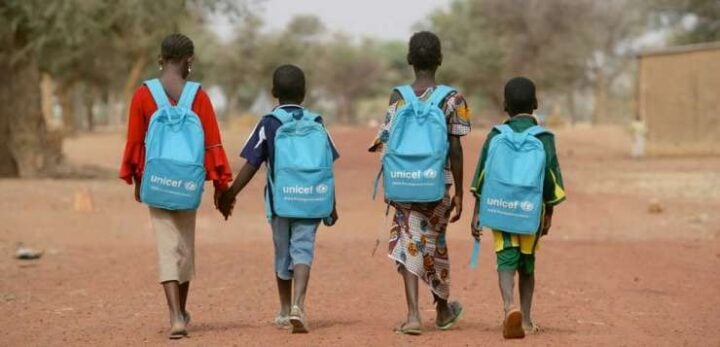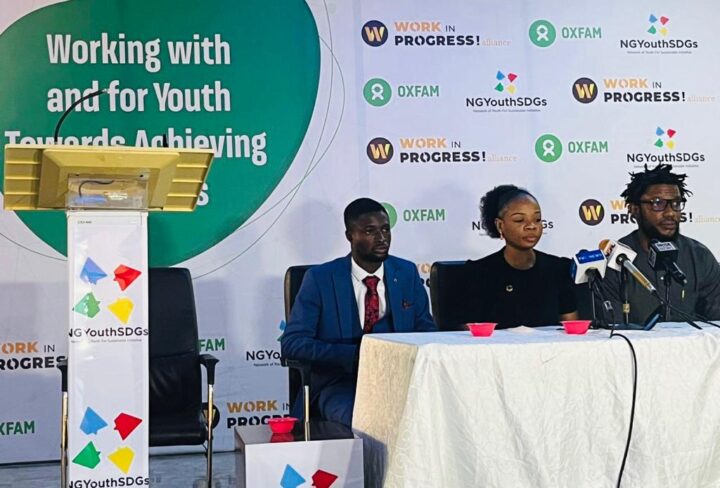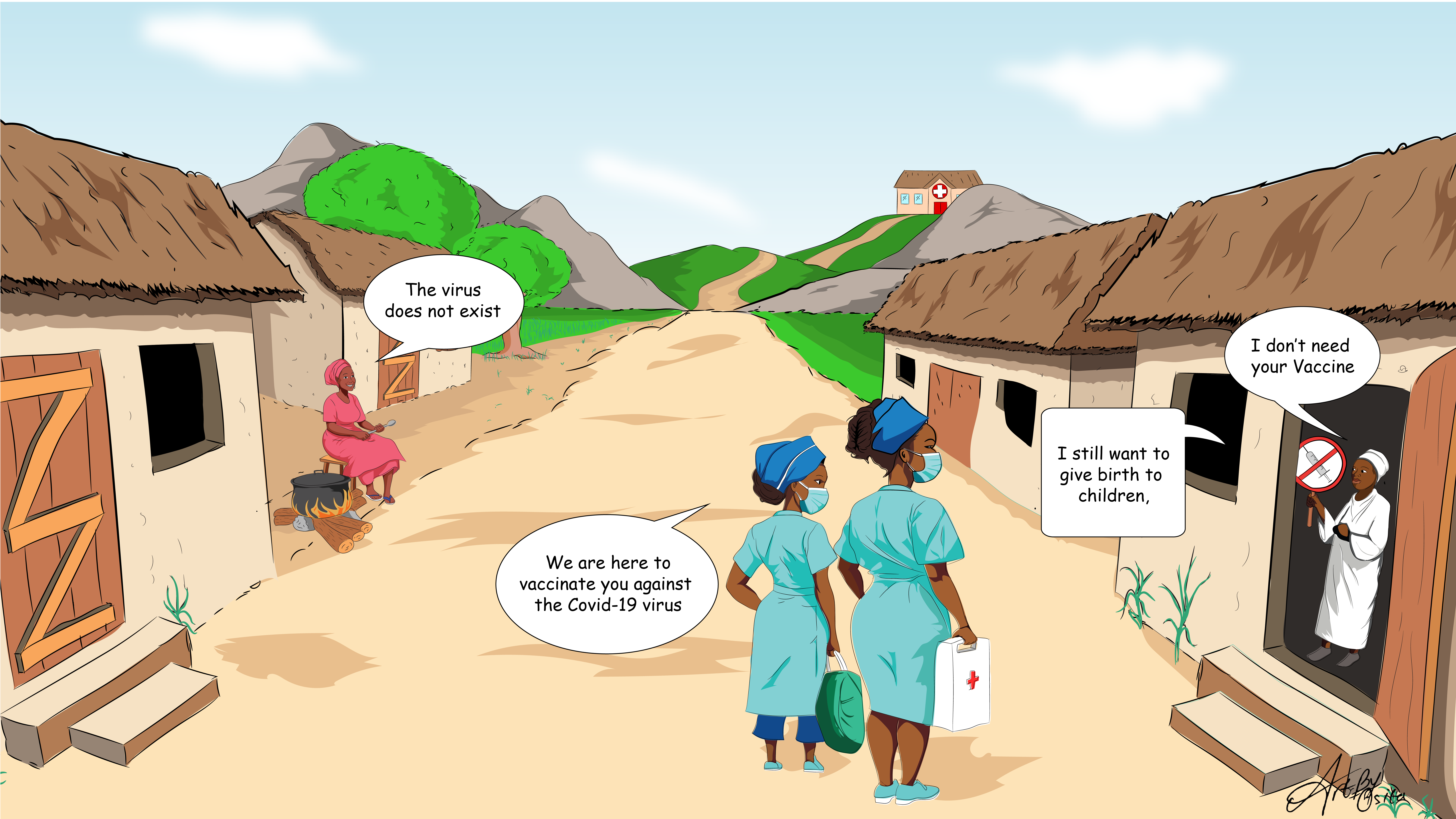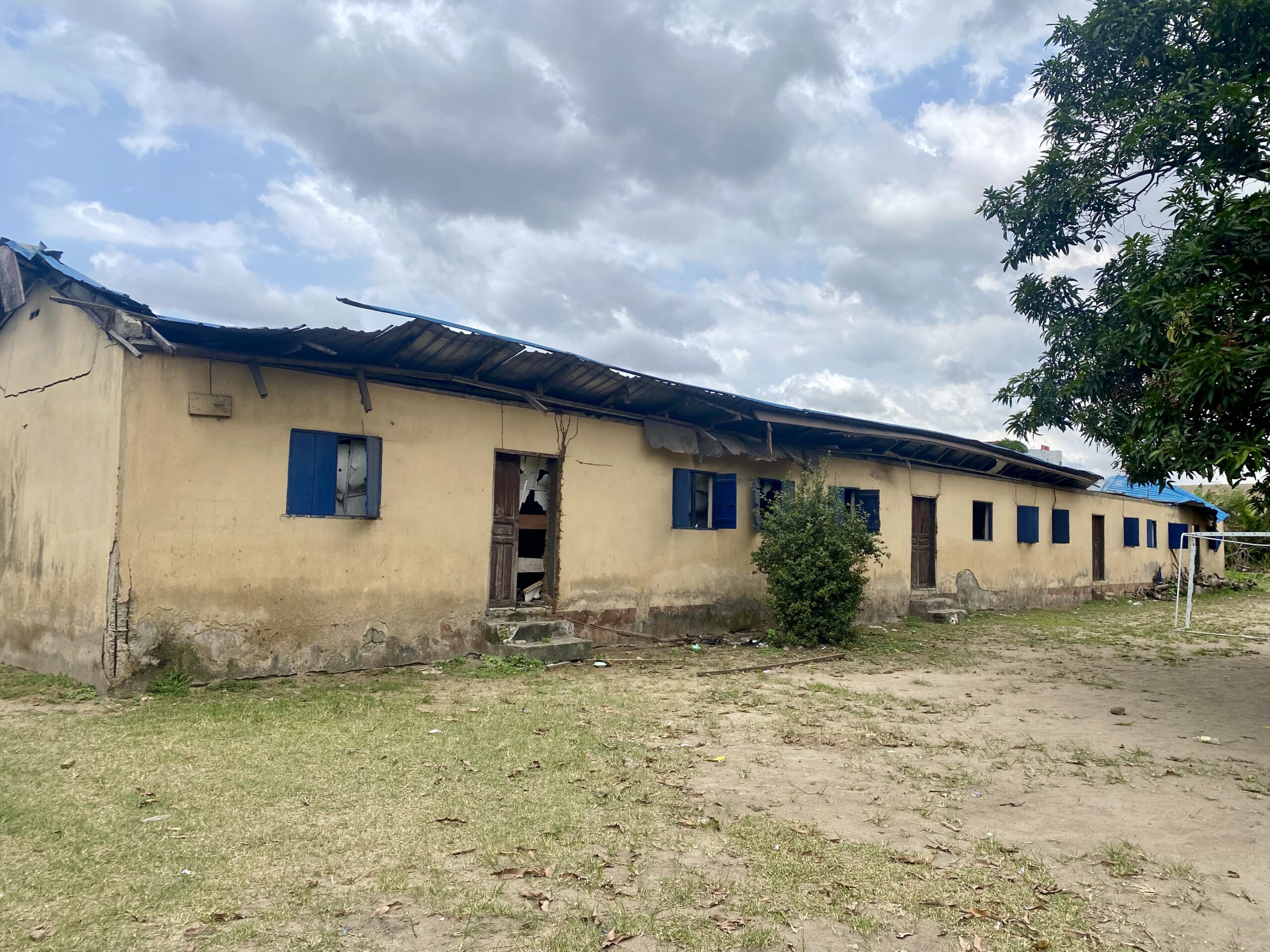Sit-at-home order: Gunmen invade Imo school, chase away students taking WASSCE
BY ANGELA NKWO-AKPOLU
Orsu, Orlu, Njaba, and Okigwe are some of the local government areas in Imo state where residents have abandoned their homes following repeated violent attacks by gunmen who are relentless in seeking total compliance with the sit-at-home order. Places like Eke-ututu market, Orsu Ihitteukwa, Ihittenansa, Amaebu, Eziawa, Umuhu okabia, and Amaruru, were all vibrant and thriving communities in Orsu local government area of Imo state that are no longer recognisable. Additional areas dealt a similar fate include Ihube in Okigwe local government area, Okwe in Onuimo, Njaba, and Orlu as they have been abandoned by both residents and security agents. Safe for gunmen in bushes, there is no activity.
These were areas that had over 1000 people working, trading, or simply retired from civil service. If seeing these desolate communities isn’t hard enough, tales of the visceral toll the effects of this violence have taken on women, their children and livelihood are heart-wrenching. The only people in these areas are gunmen, if one should mistakenly drive into these areas, they would be swooped on, sometimes kidnapped, or killed.
Stella lives around Banana Junction in Orlu local government. After marriage, she delved into petty trading hawking cassava garnished with local ingredients popularly called Abacha, a delicacy which originated from Anambra state. According to her, the real business downturn began in 2022 when violence crept into Orlu. “Normally I used to make a profit of about four thousand naira daily from sales, with which I did a weekly contribution of N10,000 to help pay school fees for our four children and provide food for my family,” she said.
Advertisement
As time went on Stella couldn’t hawk her Abacha as every time she went to the market to do so, there were people running home seeking shelter from sporadic shooting. She said the bulk of her customers lived from earnings made day to day such as drivers, conductors, and sometimes motor park operatives, fuel attendants, and passengers. “Soon I couldn’t make my weekly contributions, so I reduced it to five thousand naira, then N3,000, N1500, and later I stopped. I started buying the ingredients on credit to pay the next day. Sometimes we can barely feed as a family. Sometimes my children stayed several days at home to observe sit-at-home which made me unable to go out for my business. I cannot remember the last time my children ate a proper diet devoid of heavy carbohydrates,” Stella said between sobs.
HOW IT ALL STARTED
Until Sunday, June 27, 2021, Imo state and by extension the south-eastern region had been considered one of the safest places in Nigeria. It was a safe place to raise children and grow businesses. But all that changed when Abubakar Malami, the former attorney-general of the federation, announced the arrest of Nnamdi Kanu, the leader of the proscribed Indigenous People of Biafra (IPOB) and its military wing, the Eastern Security Network (ESN), in Kenya.
Advertisement
In protest, the leadership of IPOB ordered a ghost mode every Monday as one of the measures to demand the release of Nnamdi Kanu. When the government didn’t budge, they added more days and enforced the illegal regulation on residents in the hope that it’ll force the government to give in to their demands. They later announced a reversal but it was a little too late, as it coincided with the #EndSARS protest which provided an avenue for the ghost mode to fester and develop into a full-blown insurgency.
The #EndSARS protest was a mass action calling for the complete ban of the special anti-robbery squad (SARS) of the Nigerian police force across the country. The unit was set up in the mid-1990s to combat incidences of armed robbery, but contrary to executing this mandate the unit came to be associated with harassment of innocent citizens, extortion at gunpoint, and extrajudicial killings of suspects. Unfortunately, hiding under the guise of the #EndSARS protest, arsonists burnt down police stations and formations across the 27 local government areas of the state and region.
This reduced policing in the hinterlands to barely efficient patrol teams while other personnel were transferred to the head office in Owerri, thereby exposing citizens to violent attacks that they were unable to resist. This then became the official start of the sit-at-home cycle as we have come to know it. Without police presence and credible security infrastructure to help restore and re-enforce law and order, the people couldn’t ignore the illegal directive even as they suffered. Soon, several businesses collapsed, schools became deserted, communities abandoned, and many lives were cut short following the outbreak of insurgency and insecurity within the Southeast region.
THE PRISON BREAK THAT ESCALATED THE PROBLEM
Advertisement
It was during this time that a break-in at the Owerri correctional centre and subsequent release of over 1800 inmates sparked a rise in crime and criminality. Although some of the escaped inmates were re-apprehended, hundreds of outlaws still roamed the bushes in the state, and it wasn’t long before several of them claimed memberships of IPOB and ESN through which they inflicted more harm on innocent citizens. According to IPOB, however, only some of these alleged renegades were responsible for introducing violence to press home the order, not the original IPOB members. Those people committed the violent killings which made them become known as the ‘unknown gunmen’.
Often when interrogated about their motive or the mode of operation, they went blank because it was a smoke screen to commit robbery, arson, and vendetta. Worse still, the sit-at-home cycle became a weekly event spanning days as allegedly ordered by the prime minister of Biafra Government in Exile (BRGIE), Simon Ekpa based in Finland. People were killed or attacked, houses and vehicles burnt, and regrettably, beheading of people became the order of the day and the effects of this began to manifest economically. Sadly, despite the depth of the insurgency, locals continued to live in denial and fear, nobody was willing to speak up on the issue for fear of attack from those they called “Umu Oma” (good children).
SAD REALITY
Nkechi, 38 years of age, married with three children lives in Ihube, Okigwe local government area of Imo state. She owned a shop where she sold items used for child delivery and little babies. From delivery mats to bathing items for newborns, different baby products for bathing, clothing, bedding, feeding bottles, warmers, sanitary towels, anything relating to newborns and maternity were her mainstay. Women, sometimes in the company of their husbands thronged Nkechi’s shop. She had a business several women desired. While some bought, and paid with their money up-front, some not too buoyant customers often bought items and paid her in instalments.
Advertisement
She was very understanding and couldn’t complain. She led a comfortable life. That was her world until October 2021 when the effect of the sit-at-home cycle declared by the proscribed Indigenous People of Biafra (IPOB) began to dwell. The Monday sit-at-home cycle which started subtly had now been hijacked by the vicious groups who were using it as a cover. Soon, the cycle began to span into days, businesses suffered and debts began to mount and Nkechi closed shop and fled Ihube. The story isn’t any different from that of Ezinne who owned a provisions shop around Banana Junction, Orlu.
“Before I bought a bag of rice to retail twice a week but all that is in the past now. When the sit-at-home cycle started, my customers adjusted to paying me days later when business activities resumed and before we knew it, the debts crept in, as some people relocated for safety reasons. Due to building projects around, several artisans came here to buy something to eat if they don’t want to eat swallow. But now we have all abandoned the area. Now I sell liquor in a kiosk in Owerri where the rent is astronomical. I keep at it because my children have to feed since my husband died about four years ago,” Ezinne said.
Advertisement
Mavis was a school proprietor in Orsu local government area with about ten people in her employ as teachers, bus driver, and receptionist. There were over 120 children registered in the school. Now, after two years of insurgency, Mavis’ school has collapsed, while parents, pupils, teachers, and everyone else in the community has fled to safety. Today, she sells cooked food in a kiosk along Ekeukwu Owerri market where alongside her husband, they try to earn a living to fend for their four children and her aged mother-in-law.
Not many people know that during burials, family members pay money to the representative of the insurgents to allow them to return home to bury their relative(s) within stipulated hours’ or else safety is not guaranteed. These days, people pay money to certain people (umu oma) to ensure their country homes are not destroyed, or overtaken by gunmen. Nobody goes to such places to hold marriage ceremonies or even burials. It is safe to address them as ‘Imo State internally displaced persons’. Already, hundreds of communities have been overgrown with weeds, and crops which are mature, overripe and spoilt because nobody was around to harvest them.
Advertisement
HUMAN RIGHTS PERSPECTIVE
Civil Rights Activist and Executive Director of RULAAC, Okechukwu Nwanguma in an interview with Leadership said the sit-at-home cycle had done great damage to the people and their economy and that the persistence of the malaise illustrates plainly that criminals are in charge of the zone. According to him, insecurity and human rights violations affect women and other vulnerable or marginalised groups differently, because they mostly face the risk of victimisation for both being who they are — women, and generally as members of the community, which makes them economically disadvantaged and dependent.
Advertisement
“The insurgency has created an avenue for gross human rights abuses not only by the so-called unknown gunmen, but by the security agents themselves, which ranged from psychological, mental, sexual, economical, and several other forms of abuses,” he said.
He disclosed that several women have been raped by security agents under the pretext of law enforcement and by criminal groups who treat women as fringe benefits. Such women were often arrested, detained and subjected to sexual exploitation based on allegations that they were in relationships with wanted criminal suspects. Some of these women, according to Nwanguma, became victims of violence simply because they were rendered vulnerable when the breadwinners they were relying on “economically and financially couldn’t go out to eke out a living on account of lockdown during sit-at-home or as we saw during COVID-19”.
Unfortunately, while stories abound of victims of psychological, mental, emotional, and sexual violence, nobody volunteered to share their story for fear of reprisal. More alarming is that none may have had access to counselling or post-trauma therapy. They simply bear their scars and pretend to live a near-normal life with several insecurities buried inside them. The few who Leadership contacted, pleaded that they’d rather stay mute on their experiences with security operatives during arrest. Oftentimes, such women and girls were detained to lure their spouses, fathers or acquaintances out of hiding. They however in unison said that they were at various times indecently touched by male security operatives even as they lacked the courage to resist or know who to report the assault to.
DETAINED WOMEN CONTINUE TO LIVE IN UNSANITARY CONDITIONS
These women and girls under detention lacked access to sanitary towels during their monthly menstrual flow. Such ladies resorted to the use of rags which hitherto were used for cleaning, a situation that left them reeking of filth exposing them to infections, and cells reeking of horrible smells. Relatives could barely have unrestricted access to their wards which is mostly to provide encouragement, not many remember to bring sanitary towels for such detained ladies, which corroborated the allegation.
Security agencies must understand that women and girls under detention need sanitary towels and must create the atmosphere for them to buy or collect it, as well as dispose it without demeaning their dignity. According to Nwanguma, several detained girls were reduced to laundry operatives who washed uniforms and plates for security operatives and were also forced to sweep offices within police formations, adding that it was during the sweeping episodes where girls were released from the cells to sweep that unscrupulous operatives touched their breasts sexually and repeatedly under the guise of correction.
He said several ladies while sweeping offices, morally corrupt male security operatives molested them by fondling their breasts and buttocks. Such women were blatantly abused, sexually even with stern-looking faces. The victims just rushed to finish tasks on time and return to the safety of the cells, away from such officers.
SITUATION IN OWERRI
Back in Owerri, the Imo state capital, everyone including the government carried on normally until recently, when traders at the Ekeukwu Owerri market, which is considered the biggest in the state joined to observe the sit-at-home cycle for the safety of their business premises. They had resumed for business activity one Monday, only to see letters dropped at different locations where-in they were warned to observe the cycle or risk attacks. Nmesomma, wife and mother of two children had arrived the market that Monday with several coolers of food for sale to customers. She sold corn meal (agidi) and pepper soup with meat, dry fish pepper soup, chicken fried or as pepper soup.
Upon arrival at an abandoned market, she broke down in tears. She had about one hundred thousand naira food in different coolers, how to recoup her expenses to stay afloat simply overwhelmed her. Graciously, traders sat by the road to eat but bought on credit. Nnesomma spent the better part of Tuesday going around other shops to collect her money. Now, she monitors news to stay abreast of happenings and unfolding developments. Governor of Imo state, Hope Uzodimma, has for over two years accused political opponents of sponsoring insecurity in the state, yet has failed to mention any name or take decisive steps to end it.
ADDRESSING SIT-AT-HOME CYCLE
To address the insurgency and insecurity, Uzodimma had in May 2021, donated 100 vehicles and 1500 communication gadgets and in August 2022, donated 10 armoured personnel carriers (APC) to the Nigerian Police. Ugorji Okechukwu Ugorji, Imo commissioner for homeland security and vigilante services, told Leadership that the primary function of the ministry is to ensure the security of lives and properties, and help to organise vigilante groups in communities, to ensure they are formalised, regulated, and trained to operate within the confines of the law. He disclosed plans by the state government to float the Imo Security Organization (IMSO) to assist in providing policing, especially in communities.
According to Ugorji, the government is retraining Imo civil guards operatives to meet up with the new demands of security, noting that they already provide protection of government equipment and traffic control. Furthermore, the homeland security boss said efforts are ongoing to rehabilitate all attacked police formations and return them to use, adding that he was in talks with the state commissioner of police, Mohammed Ahmed Barde. He said the government and police were working hard to refurbish the attacked police stations and redeployment of operatives there.
Already, the Njaba police division Umuaka has resumed operations, but only after the people rallied together and refurbished it, to ensure the security of their people and properties, and not the government. Ugorji said: “We have two programmes which are the youth advocates and Hope’s Angels. We believe youths listen to themselves better than we oldies. We use these youths to champion peace messages. The Youth Advocates educate others to avoid conducts that bring them in conflict with security agencies as well as violent agitations.
“While Hope’s Angels are women advocates who preach peace to other women and during this year’s August meeting, these women will go around the state to propagate messages that we can make demands devoid of violence.”
In Igboland, the month of August is assigned to what is termed “August meeting”, an impactful gathering when women married into different communities, return to their husband’s communities to deliberate on how to improve lives. It has helped to build schools, halls, provide capital for women, and punish erring members in each given community.
Ugorji disclosed that the proponents of Biafra agitation had advanced narratives which to date had remained and had not been countered, adding that he has begun to address the issues on oneness via newspaper articles, stakeholder meetings, Youth Advocates and Hope’s Angels. He admonished communities to embrace vigilante to support the joint patrol teams pending the return of all police formations within the state and charged the military to reclaim all ungoverned spaces like bushes to restore government presence.
EFFORTS BY POLICE
Meanwhile, Echeng Echeng, the assistant inspector-general of police of Zone 9 Headquarters Umuahia, in charge of Abia, Imo and Ebonyi states has assured people that adequate measures have been put in place to frustrate and checkmate the illegal sit-at-home directive.
AIG Echeng, in a statement signed by DSP Iheanetu Bruno Chukwudera, the police public relations officer for Zone 9 headquarters, Umuahia, said he was “miffed at the nuisance the above group (Indigenous People of Biafra (Auto Pilot) group) who have chosen to cripple the economic livelihood of the States under the Zone 9 through criminalities”.
He called on individuals with actionable intelligence on crime prevention to share with the police. On his part, Imo state police spokesperson, Henry Okoye said the command had activated visibility policing and operation show of force. Okoye said the state police boss, Mohammed Ahmed Barde, had engaged the command’s tactical team and 18PMF on a confidence-building patrol and operation show of force exercise across the length and breadth of the state to re-engineer public confidence in the security architecture of the state and encourage Imolites to go about their lawful business without any fear of attack or molestation. Regrettably, on any sit-at-home day, there is not a single security operative in sight, that day, they opt to wear mufti and stay out of circulation, which residents say means, “sorry just face the music yourself.”
WAY FORWARD
A security expert who pleaded anonymity for safety concerns said the Imo State Police command should rise above reactive to proactive policing. In several places like Azia, Oru along the Owerri-Onitsha expressway, innocent commuters alight from vehicles, trek past police and army checkpoints with hands in the air, except one is elderly or heavily pregnant and cannot walk.
He said: “Traumatising people after a hit by gunmen must stop. The moment police arrive a crime scene immediately after a hit, they traumatize residents. They force people to sit on the ground, walk with hands raised, and just arrest anybody remaining in a community. They should stop those archaic policing style and think ahead of these gunmen.”
According to him, police should sensitise their men to shun illegal rip-off points of frisking innocent young people for quick money under the guise of advance fee fraud. Though it may be near impossible but achievable, improve security with plain clothes intelligence operatives. He called on the state government to provide tax heaven to businesses in the state especially those grappling with insecurity and insurgency caused by sit-at-home enforcers.
“Government should give traders tax waivers, stop the toll collection and help them recover first. Gain the trust of people devoid of politics, fix the police formations across the state, secure people and places first, so those who ran away will return to the safety of their communities. Enough of blames, deploy trust and together Imo people will recover,” he said.
MNK’s STAND
Surprisingly, the detained IPOB leader, Mazi Nnamdi Kanu, described the sit-at-home as a waste of time, resources, and energy, apparently hijacked by opportunistic scavengers to wreak havoc on innocent people, which no doubt included women and families.
In a handwritten letter to Ekpa, Kanu lamented that anyone engaged in the sit-at-home was not his disciple, adding that haters of Biafra and mindless murderers in uniform masked as combatant enforcers against the cycle were unleashing mayhem against the people they swore to protect. Kanu explained that he had sent countless messages to the enforcers of sit-at-home to desist because they were doing so without his authorisation.
The cycle had unfortunately created more poverty, widows, orphans, and displaced persons in the state and south-east region. Apparently, he instructed his lawyer, Barr Alloy Ejimakor to call out Ekpa on the issue, since private correspondence had been ignored. He disclosed that he wasn’t begging for his freedom but quickly added that Nigeria should have the decency to obey her own laws. Kanu said the main issue of concern of people should be the delays in hearing the appeal filed by the federal government against his release currently before the supreme court.
EFFORTS BY OHANAEZE NDIGBO AND SOUTH-EAST GOVERNORS
The pan-Igbo socio-cultural organisation, Ohanaeze Ndigbo Worldwide, has placed a bounty for the arrest of Simon Ekpa. They had accused the Finland-based lawyer of declaring a second Biafra war on the south-east zone. Already, they have announced a $500,000 bounty on Ekpa and called on the federal government to deploy soldiers to every corner of the zone.
And just recently, the national assembly added their voice to the call for Ekpa’s arrest, who on his part said he was not to blame. Till date, the five southeast governors have never met to discuss insecurity and insurgency in the zone as their counterparts in the western and northern regions have done. Though they champion meetings, they are never all in attendance as some are represented by their deputies who most times cannot take far-reaching decisions without the governor’s input.
Occasionally, government-issued statements to warn civil servants and business providers to ignore the sit-at-home directive yet without adequate measures to back the order. Whereas government officials go about with loads of security operatives and gadgets to ensure their own safety.
This report was done with support from the Women Radio Centre and MacArthur Foundation.
